
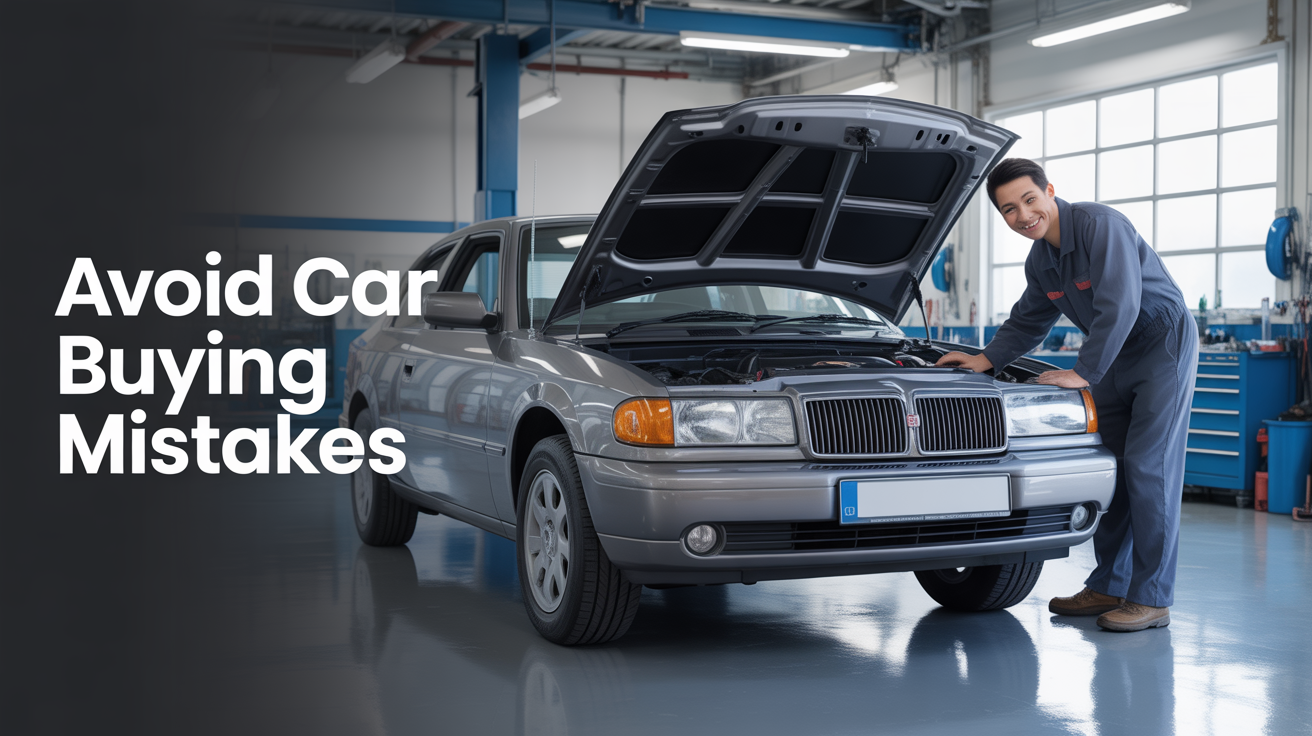
How to Buy a Reliable Used Car: The No-BS Guide That Actually Works
Learning how to buy a reliable used car isn’t rocket science. But most people still get it wrong.
I’ve bought 12 used cars in my life. Made every mistake you can think of. Lost thousands because I didn’t know what I was doing.
Table of Contents
Here’s what I wish someone had told me before I started.
Why Most People Buy Rubbish Cars (And How to Avoid It)
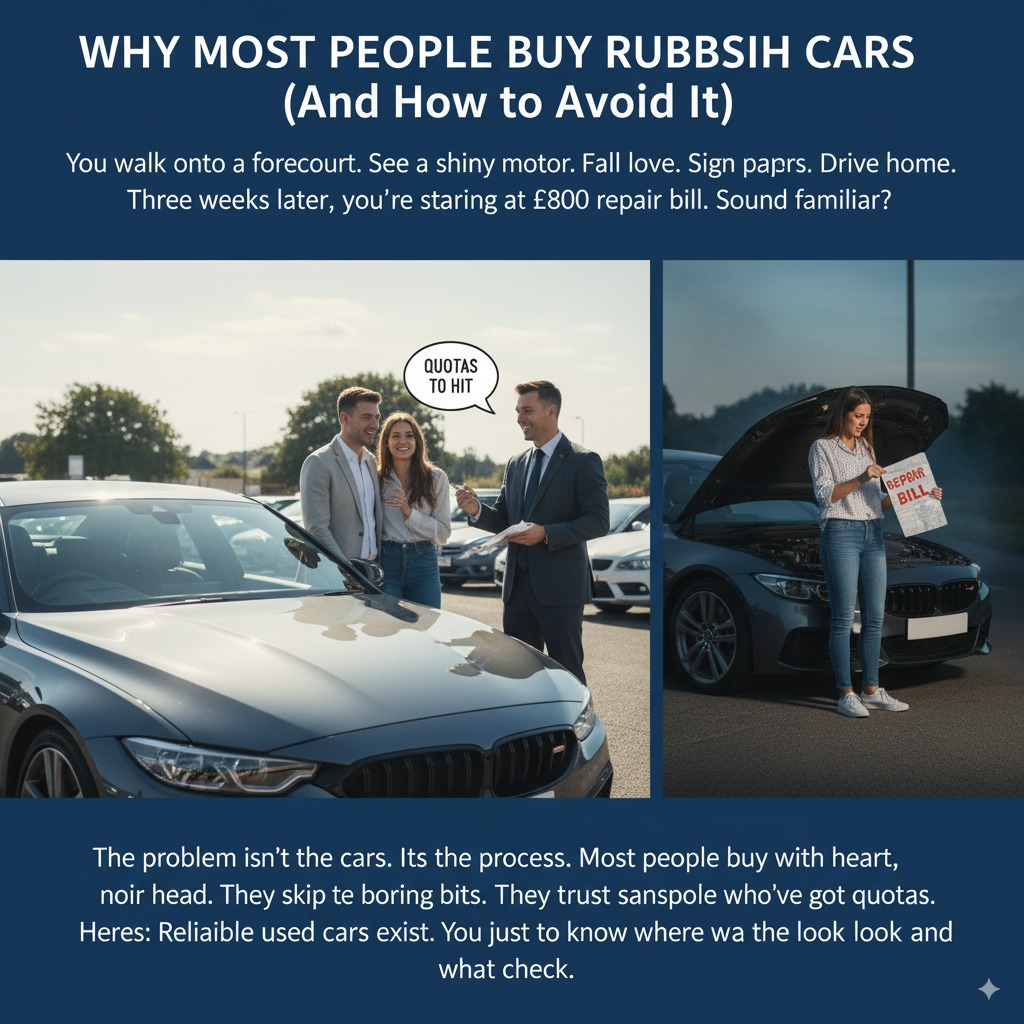
You walk onto a forecourt. See a shiny motor. Fall in love. Sign papers. Drive home. Three weeks later, you’re staring at a £800 repair bill.
Sound familiar?
The problem isn’t the cars. It’s the process.
Most people buy with their heart, not their head. They skip the boring bits. They trust salespeople who’ve got quotas to hit.
Here’s the thing: Reliable used cars exist. You just need to know where to look and what to check.
What Makes a Used Car “Reliable” Anyway?
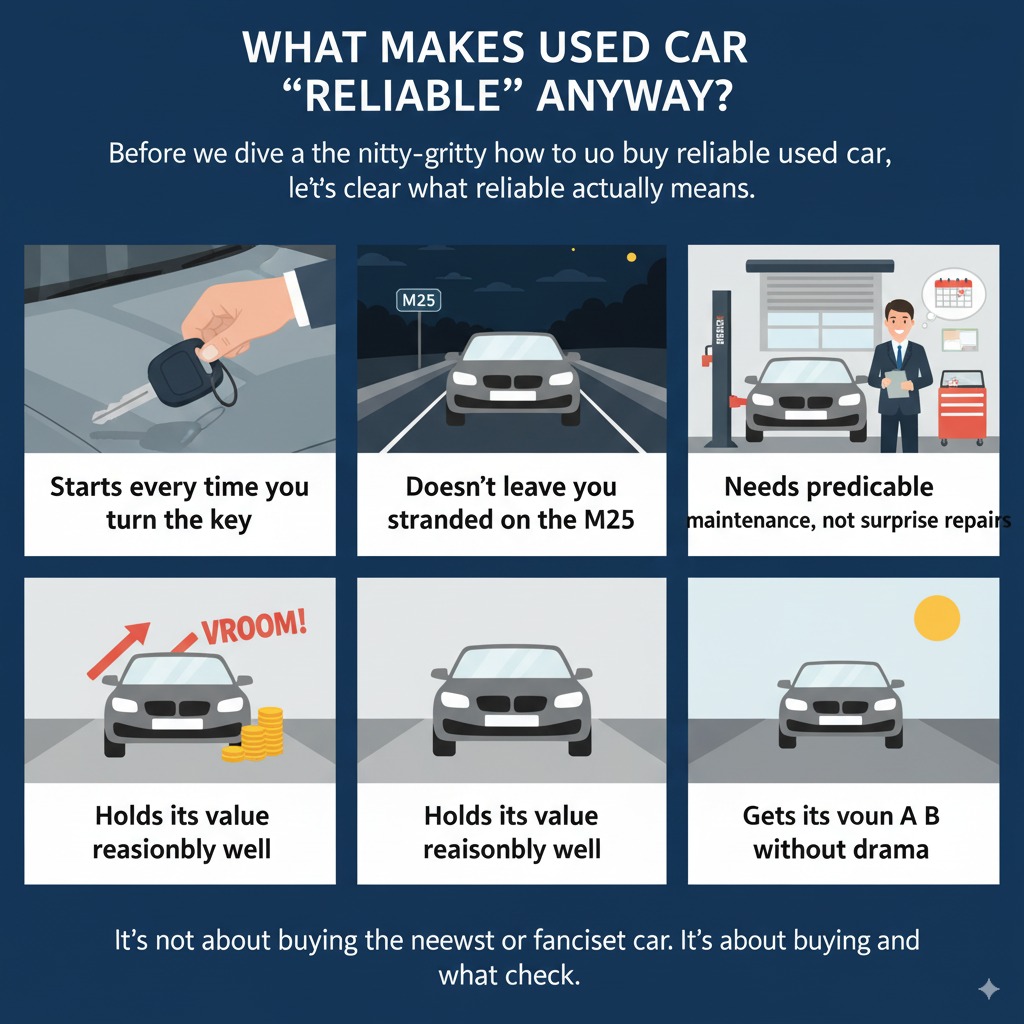
Before we dive into the nitty-gritty of how to buy a reliable used car, let’s get clear on what reliable actually means.
A reliable car:
- Starts every time you turn the key
- Doesn’t leave you stranded on the M25
- Needs predictable maintenance, not surprise repairs
- Holds its value reasonably well
- Gets you from A to B without drama
It’s not about buying the newest or fanciest car. It’s about buying smart.
Step 1: Set Your Budget (And Actually Stick to It)
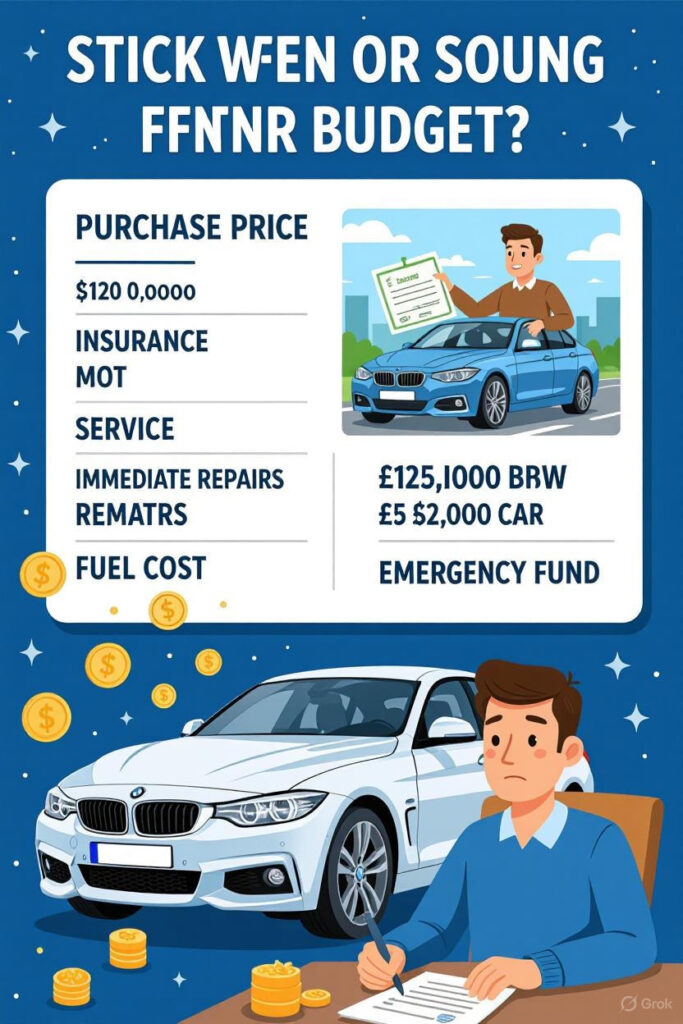
I know a bloke who went shopping for a £5,000 car. Came home with a £12,000 BMW. Spent the next two years eating beans on toast to pay for it.
Don’t be that person.
Your real budget includes:
- The purchase price
- Insurance (get a quote first)
- MOT and service costs
- Immediate repairs you might need
- Fuel costs
Pro tip: Whatever number you have in your head, knock 20% off. That 20% is your emergency fund for when things go wrong. And they will go wrong.
Step 2: Research Like Your Life Depends on It
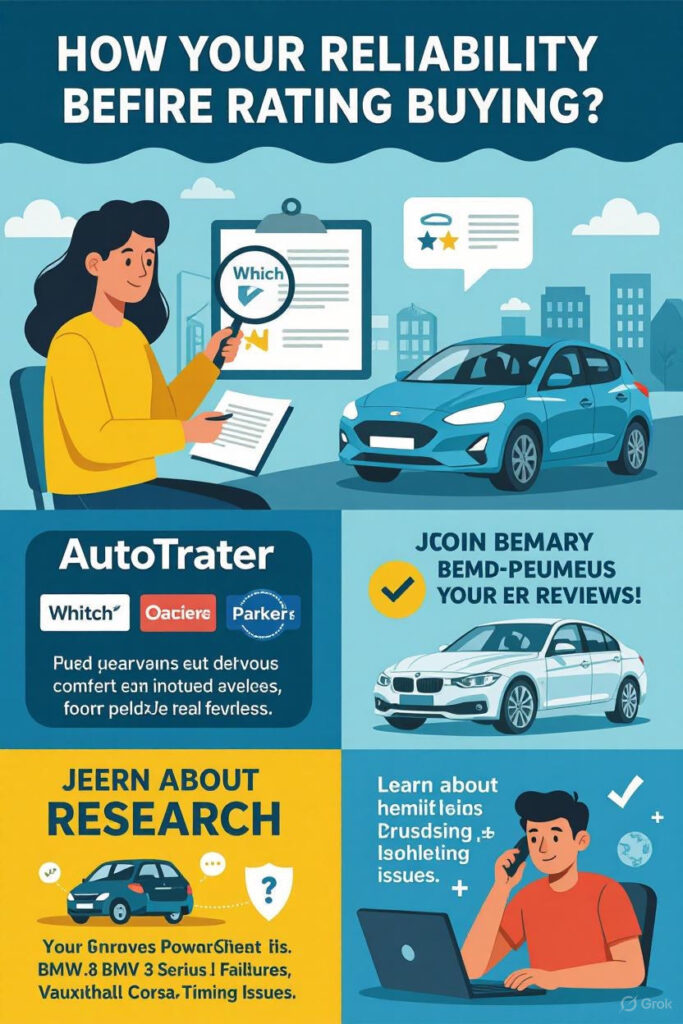
This is where most people mess up. They see a car, like the colour, and buy it.
Smart buyers research first:
Check Reliability Ratings
- Look up your target models on Which? Car Reviews
- Check Parker’s reliability scores
- Read AutoTrader owner reviews (the brutally honest ones)
- Join Facebook groups for specific car models
Know the Common Problems
Every car has issues. The trick is knowing what they are before you buy.
For example:
- Ford Focus (2011-2018): Dodgy PowerShift gearboxes
- BMW 3 Series (2005-2012): High-pressure fuel pump failures
- Vauxhall Corsa (2014-2019): Timing chain problems
Internal linking opportunity: Link to your car reliability guides or specific model reviews
Step 3: Where to Find Reliable Used Cars
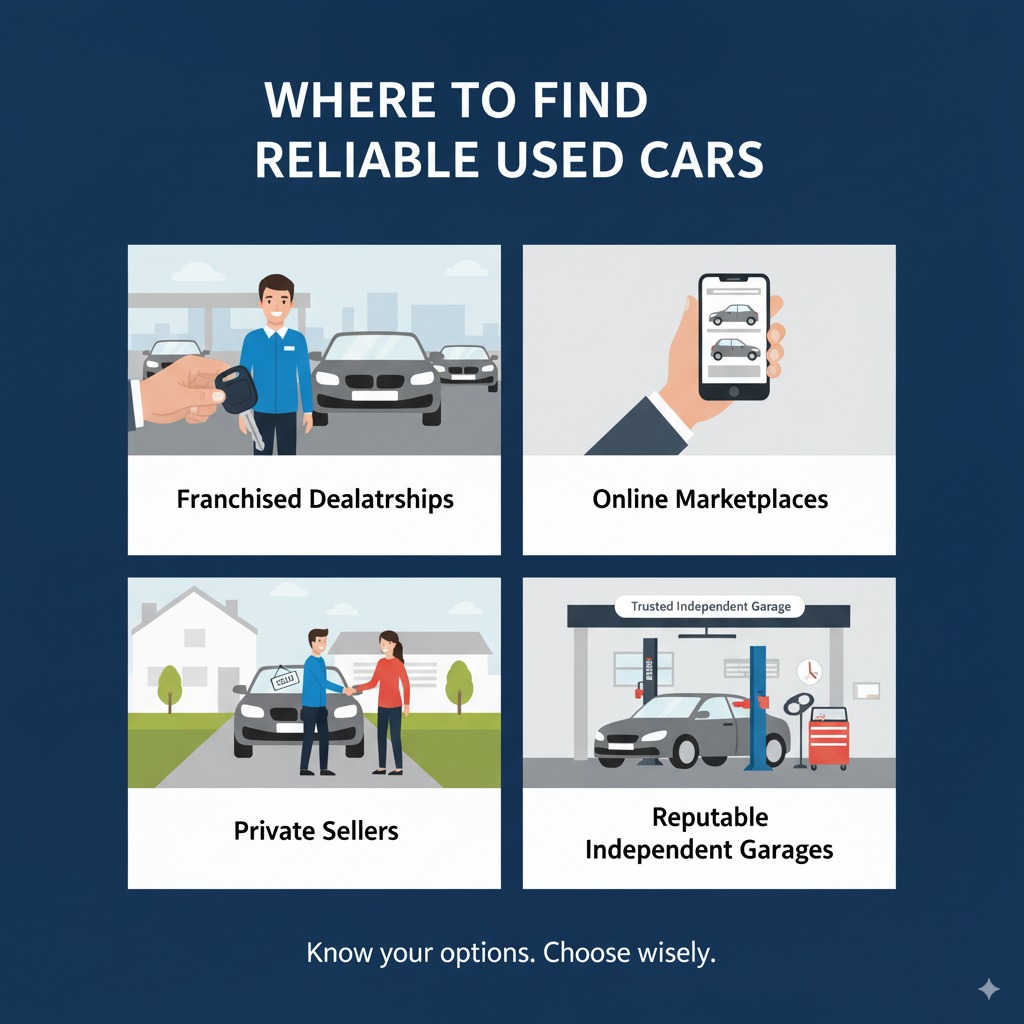
Not all car sources are created equal.
Franchised Dealers
Pros: Warranties, comeback rights, professional preparation. Cons: Higher prices, pressure sales tactics
Best for: If you want peace of mind and don’t mind paying extra
Independent Dealers
Pros: Better prices, more negotiation room. Cons: Variable quality, limited warranties
Best for: When you know what you’re looking for
Private Sales
Pros: Lowest prices, full history from the owner. Cons: No comeback, sold as seen
Best for: Experienced buyers who can spot problems
Online Platforms
- AutoTrader: Biggest selection
- Motors.co.uk: Good search filters
- CarGurus: Shows if prices are good deals
- Facebook Marketplace: Hidden gems, but buyer beware
Never buy from:
- Car parks behind pubs
- People who won’t let you see V5C
- Anyone pressuring you to “decide today”
Step 4: How to Inspect a Used Car Like a Pro
This is where the rubber meets the road. Literally.
I’m not going to tell you to check 47 different things. That’s mental.
Focus on these deal-breakers:
Exterior Check
- Rust spots (especially around wheel arches and doors)
- Panel gaps that don’t line up (accident damage)
- Different paint shades (more accidental damage)
- Tyres worn unevenly (alignment issues or suspension problems)
Interior Check
- Seats match the mileage (worn seats on a “low mileage” car = red flag)
- All electrics work (lights, radio, air con, windows)
- Warning lights on dashboard (anything flashing = walk away)
Engine Bay
- Oil level and colour (black oil = poor maintenance)
- Weird noises when running
- Leaks or stains on the ground underneath
Test Drive Essentials
- Cold start (does it struggle?)
- Steering pulls to one side (alignment or tyre issues)
- Brakes feel spongy (expensive fix)
- Gearbox changes smoothly (automatics especially)
- All gears work (including reverse)
Story time: I once looked at a Golf that seemed perfect. Drove beautifully. But when I checked the oil, it looked like chocolate milk. Head gasket failure is waiting to happen. Walked away. The seller called me three weeks later – the engine had blown.
Step 5: The Paperwork That Actually Matters
Boring but essential.
Documents You Must See:
- V5C (log book) – must match seller’s name and address
- MOT certificate – check how long is left
- Service history – stamps or receipts, not just a book
- Previous MOT certificates – show what’s been flagged before
Red Flags in Paperwork:
- V5C in someone else’s name
- No service history (“I’ve always maintained it myself” = run)
- Recent MOT with lots of advisories
- Insurance write-off markers (Cat S, Cat N)
Internal linking opportunity: Link to your guide on checking vehicle history
Step 6: The Money Conversation (Without Getting Mugged Off)
Never pay the asking price. Ever.
Negotiation isn’t about being a knobhead. It’s about being prepared.
Before You Negotiate:
- Check Parker’s Guide for trade and private values
- Look up similar cars online
- List any faults you’ve found
- Know your walk-away price
Sample Negotiation:
“I like the car, but I’ve noticed the tyres need replacing soon and there’s some rust starting on the rear arch. Based on similar cars I’ve seen, I’m thinking £X is fair. What do you think?”
Not: “This is a piece of junk, I’ll give you half.”
Payment Tips:
- Bank transfer only for amounts over £1,000
- Cash for smaller amounts (but count it together)
- Never pay deposits without seeing all the paperwork first
Step 7: Final Checks Before You Drive Away
You’re nearly there. Don’t mess it up now.
Last-Minute Checklist:
- ✅ Insurance sorted (you can’t drive without it)
- ✅ V5C signed over properly
- ✅ All keys and manuals included
- ✅ Spare wheel and tools present
- ✅ Final test of all functions
Get It in Writing:
Even private sales need a receipt. Include:
- Date and price paid
- Car details (reg, make, model, mileage)
- “Sold as seen” if private sale
- Both signatures
The Brands That Won’t Let You Down
Based on reliability data and my own experience:
Most Reliable Used Car Brands:
- Toyota – boring but bulletproof
- Honda – engineered to last
- Mazda – reliable and fun to drive
- Lexus – Toyota’s posh cousin
- Skoda – VW quality without the badge tax
Avoid These (Sorry, Not Sorry):
- Range Rover – beautiful but bankrupt you
- Jaguar – more time in the garage than the driveway
- Alfa Romeo – for masochists only
- French cars over 5 years old – electrical nightmares
Internal linking opportunity: Link to your brand reliability rankings
Red Flags That Should Make You Run
Some warning signs are subtle. Others hit you like a brick.
Walk away immediately if:
- The seller won’t let you inspect properly
- No test drive allowed (“it’s not insured”)
- Pushy about a quick sale
- Won’t provide documents
- Car’s parked miles from the seller’s address
- Price is “too good to be true”
Trust your gut. If something feels off, it probably is.
After You Buy: The First 30 Days
Congratulations. You’ve bought a car. Now what?
Week 1:
- Book it in for a full service (even if recently serviced)
- Check all fluids regularly
- Learn the car’s quirks
Week 2-4:
- Address any minor issues found during inspection
- Join owner’s groups for your car model
- Start a maintenance log
Beyond:
- Service regularly (not just when something breaks)
- Keep receipts for everything
- Learn basic maintenance (checking oil, tyre pressures)
Common Mistakes That Cost You Thousands
I’ve made these. You don’t have to.
The Biggest Blunders:
- Buying with emotion instead of logic
- Skipping the inspection because you’re in a hurry
- Not researching the specific model
- Ignoring service history gaps
- Paying too much because you didn’t negotiate
The Most Expensive Mistake:
Buying a car that needs major work. That £2,000 bargain becomes a £5,000 nightmare real quick.
Remember: There’s always another car. Don’t get attached to one before you own it.
Frequently Asked Questions
What mileage is too high for a used car?
It’s not about the number on the clock. It’s about how those miles were done. 100k motorway miles beats 50k city stop-start. Look for:
- Service history that matches mileage
- Wear consistent with age
- How the car drives and feels
Should I buy from a dealer or private seller?
Private sellers if you know what you’re doing and want the best price. Dealers if you want comeback rights and don’t mind paying extra. Never buy from dodgy car parks or people who seem shifty.
How much should I spend on a used car?
Rule of thumb: no more than 10-15% of your annual income. But also consider:
- Insurance costs (get quotes first)
- Fuel consumption
- Expected repairs
- How long you’ll keep it
What’s the best age for a used car?
Sweet spot is usually 3-5 years old. Most depreciation has happened. Still modern enough for reliability. Warranty might still have time left.
Is high mileage always bad?
Not necessarily. Highway miles are easier on cars than city driving. A well-maintained 150k car beats a neglected 50k car every time. Look for complete service records.
Should I get a pre-purchase inspection?
If you’re spending serious money (£8k+) and don’t know cars well, yes. RAC and AA do them for around £200. Could save you thousands if they spot problems. Worth it for peace of mind.
What if the car breaks down after I buy it?
From a dealer: you have consumer rights for significant problems. From private seller: tough luck, sold as seen. This is why emergency funds and proper inspection matter.
How do I know if the price is fair?
Check multiple sources:
- Parker’s Guide values
- Similar cars on AutoTrader
- Recent sold prices if possible Use this data to negotiate confidently.
The bottom line on how to buy a reliable used car? Do your homework. Trust your instincts. Don’t rush.
Most people buy cars like they’re ordering pizza. Quick decision, hope for the best.
Smart buyers treat it like buying a house. Research. Inspect. Negotiate. Verify.
Follow this guide and you’ll drive away with a car that serves you well for years to come, not one that empties your bank account every month.
Internal linking opportunity: Link to your car maintenance guides, insurance tips, or financing options
Add a comment Cancel reply
Comments (0)
Affordable Car Insurance for New Drivers: How I Cut My Premiums by 60% - RealCarReviews
[…] car choice is the biggest factor in your premium. Bigger than your postcode. Bigger than your […]
Categories
- Auto Detailing (3)
- Car News (3)
- Car Reviews (3)
- Uncategorized (2)
Recent Posts
About us

Popular Tags
Related posts










